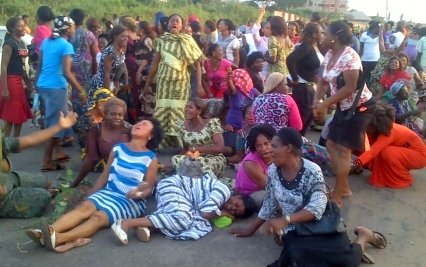
On a bright Thursday morning in Anambra State, a collective of women, united in their purpose and determination, staged a peaceful protest against a practice they deemed not only ‘barbaric’ but also ‘unwholesome’. The tradition in question forces widows to drink the water used in cleansing the bodies of their deceased husbands, a ritual that the women vehemently oppose. Their protest drew attention to incidents occurring within the Atani community, situated in the Ogbaru Local Government Area of the state.
These women, who are also staunch advocates for women’s rights, assembled at the Anambra State Children, Sexual and Gender-Based Violence Court located in Awka, the state’s capital. They expressed their discontent and demanded justice by displaying placards with poignant messages like “Stop violence against women and girls in Anambra State”, “Ogbaru men and women, allow our widows some peace,” and “Stop all obnoxious laws and harmful widowhood practices in Anambra State.”
At the forefront of the protest was Hope Okoye, Chairperson of Violence Against Persons Prohibition in the state. She engaged with the press during the protest, explaining that the peaceful demonstration was a means of amplifying their voices against these horrific practices. Okoye emphasized the protest as a clarion call to communities in Ogbaru and beyond, urging them to critically review and abandon existing traditions that perpetrate harm against women and widows.
Okoye further implored all “well-meaning indigenes of Ogbaru and indeed, Anambra State, both at home and in the Diaspora,” to voice their opposition to the ill-treatment of women and widows. This call to action extended to all corners of the state, advocating for a unified front against these atrocities.
Moreover, she appealed to the administration of Governor Charles Soludo. Through the state’s Children, Sexual and Gender-Based Violence Court, she urged for enhanced protection of women and widows, and for justice to be served to the perpetrators of these harmful practices.
The protest was prompted by an incident involving a 75-year-old man, Albert Eligbue, from Atani community. He was arraigned before the Chief Magistrate of the Anambra State Children, Sexual and Gender-Based Violence Court, charged with forcing his sister-in-law, Mrs. Patricia Eligbue, to undergo the heinous ritual of drinking the water used to wash her late husband’s body.
Albert, the deceased’s brother, allegedly subjected Patricia to this ordeal to supposedly confirm that she hadn’t caused her husband’s death. Patricia recounted to the Anambra State Commissioner for Women and Social Welfare, Hon. Ify Obinabo, the physical abuse she had endured from her husband’s family, who tormentingly labeled her a witch.
She narrated a disturbing incident where her husband’s siblings assaulted her and her only child, blaming her for all their misfortunes. Despite her relatives’ efforts to intervene, Patricia was forcibly kept with her husband’s family, held back under the pretext of attending the burial of a nephew who had also passed away.
On the day of the burial, Patricia was forced into the room housing the deceased’s body. She was made to walk over the corpse, which was laid with a cutlass, four times. Subsequently, she was coerced into drinking the water used to wash the corpse, with the remainder of the water being poured over her.
The court hearing on Wednesday resulted in Albert’s arrest and subsequent arraignment on five counts. Inspector Onyema Ayogu, the prosecutor, informed the court that Albert was charged with conspiracy to commit felony and assault, offenses punishable under sections 495(a) and 190 of the Criminal Code Cap 36 Vol. 11 revised laws of the Anambra State of Nigeria, 1991.
Despite the weight of the charges against him, Albert maintained his innocence, pleading not guilty in court. The Chief Magistrate, in response to his plea, ordered Albert’s remand at the Nigerian Correctional Centre in Awka.
However, Albert was granted bail, set at N500,000, with the condition that he must provide a surety. This surety must either be the traditional ruler, the traditional prime minister (Onowu), or the President General of the Atani community, underlining the severity of the charges and the requirement for a figure of significant standing in the community to vouch for him.
The unfolding of these events served as a catalyst for the women’s protest, amplifying their call for an end to such harmful practices. As they marched with their placards held high and their voices resonating in unison, these women displayed an unyielding resolve to effect change.
Their demand was for the societal norms and traditions that propagate harm against women, particularly widows, to be examined, criticized, and ultimately discarded. The women’s rights activists further stressed the need for the state’s Children, Sexual and Gender-Based Violence Court to fulfill its role in protecting women and widows and ensuring that those guilty of perpetrating harmful practices are rightfully punished.
As the case awaits its next hearing, scheduled for June 7, 2023, the women of Anambra State continue their peaceful protests, advocating for justice and equality. Their courageous stand against harmful practices echoes across the state, serving as a potent reminder of the urgent need for societal reform and greater protection for women, especially those who find themselves in vulnerable situations such as widowhood. Their message is clear: harmful practices must end, and justice must prevail.


















